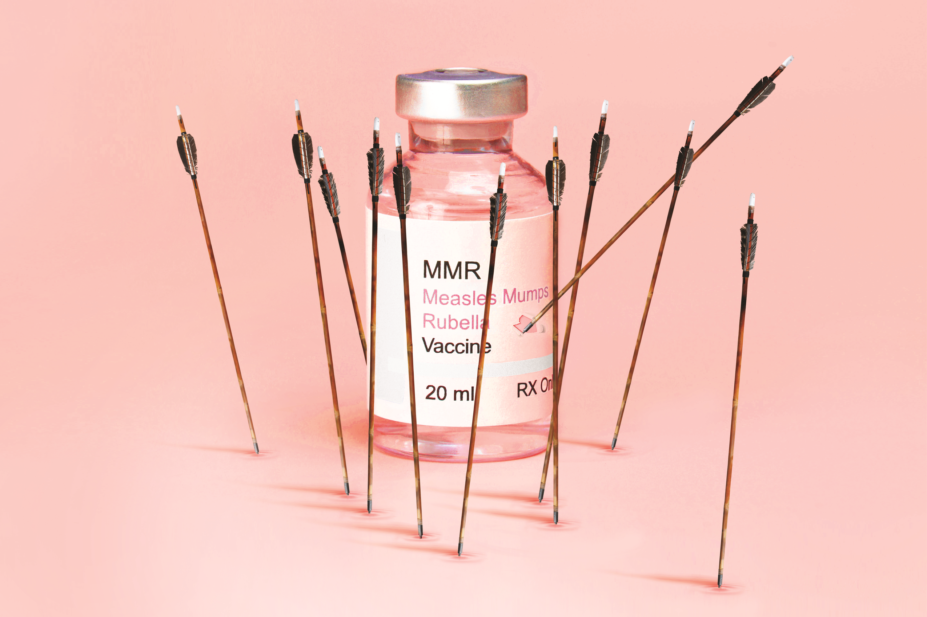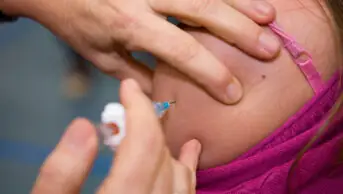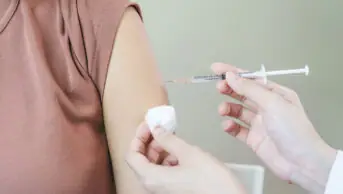
JL / The Pharmaceutical Journal
Over the past 20 years, vaccination has dramatically reduced the number of deaths from measles in the UK. Public Health England estimates that since the measles vaccination was introduced in the UK in 1968, 20 million cases of measles and 4,500 subsequent deaths have been averted.
However, in 2018 there were nearly four times as many laboratory-confirmed cases of measles in England (966) compared with 2017 (259). Although levels of infection have fallen since their peak in 2012, they remain above recorded levels in the 1990s, and the proportion of two-year-olds having the first dose of measles, mumps and rubella (MMR) vaccine in England in 2018 was the lowest since 2012, at just 91.2% (see Infographic here). Only 4 of the 149 local authorities have met the 95% coverage target for both doses of vaccine needed for measles to be eradicated.
The majority of measles infections are in unvaccinated people — particularly those aged 15 years and over who missed out on the MMR vaccine when they were young. Measles infection can have serious consequences — such as pneumonia, encephalitis, deafness and sight loss — and it is disturbing that, as a nation, we appear to be slipping back to a place where children could be exposed to such risks.
The BBC recently reported a 296% increase in internet searches about the MMR vaccine … while the search term ‘anti-vaccine’ has increased by 171%
Public Health England maintains that public confidence in the MMR vaccine remains high, and a lack of available appointments is a bigger issue. However, the BBC reported a 296% increase in internet searches about the MMR vaccine in the past 12 months in the UK, while the search term ‘anti-vaccine’ has increased by 171%.
These trends are worrying policymakers. Matt Hancock, health and social care secretary, has urged social media companies to take action and Simon Stevens, chief executive of NHS England, has pointed out that “vaccine deniers” are also getting some traction through “fake news”.
The anti-vaccination movement is an old one. In the UK, it dates back to the Anti-Vaccination League — an organisation formed in the 1800s after vaccination for all infants in the first three months of life was made law. At the time, vaccination was depicted by the Anti-Vaccination League as a skeleton holding a syringe and by others as a beast with an insatiable appetite for young children in leaflets urging parents not to vaccinate.
Methods of spreading misinformation may have become much more sophisticated, but their central aim to provoke doubt and fear has not. The World Health Organization (WHO) points out that no single intervention can address vaccine hesitancy because it is often multifactorial, with individual, group and contextual influences. The WHO says the best thing to do is to have a dialogue with patients and, of course, one of the most suitably placed professions to do this in the NHS is pharmacy.
It may be difficult in a busy pharmacy to have a nuanced discussion with a parent about their fears over vaccination, but it is possible. A learning article published in the January 2019 issue gives some useful advice on how members of the pharmacy team can address myths about the MMR vaccine while offering advice and support. Any refutation should emphasise the facts — not the myths — and strong claims denying the possibility of risk and pain associated with vaccinations should be avoided as they may backfire.
This is a battle of hearts and minds that the NHS must win, and pharmacy can make a real difference. Who knows — a short conversation with a wary parent could one day save a child’s life.


